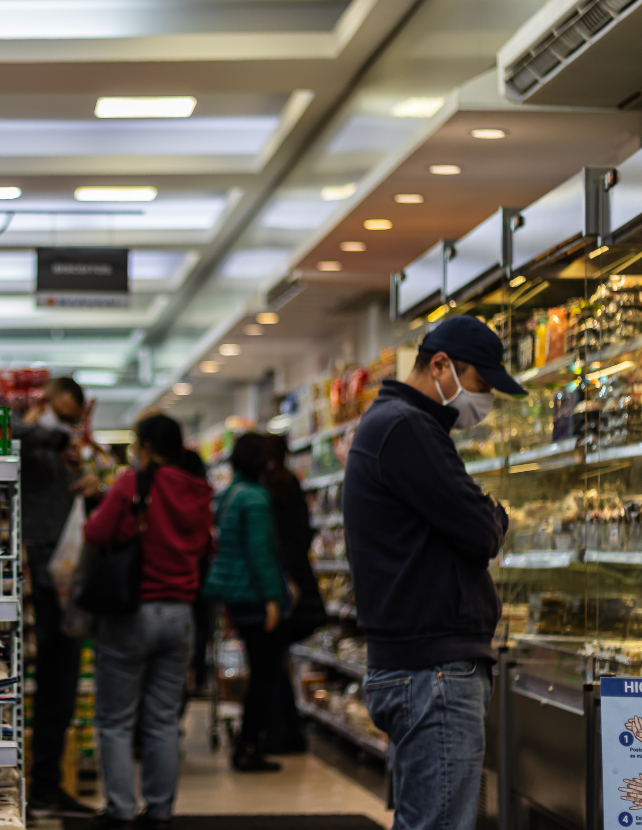
Press Release
California Food Programs Boosted Food Security Among Low-Income Californians During COVID Pandemic
-
Focus Areas
Chronic Disease Prevention -
Issues
Nutrition & Food Security -
Expertise
Public-Private Partnerships, Research – Quantitative -
Programs
Center for Wellness and Nutrition, Roots of Change -
Strategic Initiatives
COVID-19

Public Health Institute study shows CalFresh, Pandemic EBT programs left fewer families hungry than pre-pandemic
Oakland, CA- New research from the Public Health Institute’s (PHI) Center for Wellness and Nutrition shows that increases in food assistance programs implemented by the California Department of Social Services (CDSS) during the COVID-19 pandemic helped decrease food insecurity for low-income Californians. The new study, published in the CDC’s “Preventing Chronic Disease” showed that despite the pandemic, very low food security for low-income California families dropped by 5 percentage points between April and July 2020, a 28% reduction from the pre-pandemic period, coinciding with enhancements in state and federal food assistance programs. In a separate project in late 2020, PHI joined Los Angeles County and its partners to distribute nearly $22 million in food benefits to nearly 30,000 households or individuals reaching another 100,000 Los Angeles community members who do not qualify for or are unable to access federal food programs.
According to a CDSS report, in 2020, in response to the pandemic and its economic impact on low-income residents, the agency increased CalFresh benefits (California’s SNAP (formerly known as food stamps) program) and distributed$1.36 billion in food assistance through Pandemic EBT food assistance cards, reaching nearly 95% of children from eligible families.
The PHI study shows that the CDSS efforts had an impact: 14% of low-income Californians reported facing very low food security during the COVID-19 pandemic, compared with 19.4% who reported that status in the pre-COVID period from November 2019 to March 2020. The PHI data supports the recent decision by the Biden administration to extend and expand the federal Pandemic EBT and SNAP food assistance programs.
But not all hungry Californians qualify for or are able to access federal food programs. To reach such at-risk Los Angeles County community members, in November PHI’s Roots of Change program, the Center for Wellness and Nutrition and their strategic partner Wholesome Wave worked with LA County, local governments, grocery stores, and 19 LA-area community-based groups to get food to those most in need. In less than two months, the project distributed nearly $22 million worth of food cash benefits to nearly 30,000 households or individuals, representing 100,000 people altogether, through the Tangelo smart phone app and Albertsons and Northgate Gonzalez Market cards. The effort brought $12 million in purchases to these local grocery stores that were able to develop and accept food-only cards. In total, over 200,000 boxes of food were delivered to homes.
The infrastructure created by PHI and partners to rapidly deliver benefits and food to hard-to-reach families can be easily replicated by other counties and states, especially where there are pandemic and other funds that can be dedicated to feeding the hungriest. A bill being introduced in California aims to build upon the pilot by permanently extending food benefits to immigrants left out of federal assistance.
“As the LA County pilot shows, California’s immigrant communities continue to face barriers to getting the food they need, and emergency actions have been vital and effective at reducing hunger during the pandemic,” said Betzabel Estudillo, a Senior Advocate with Nourish California. “The pilot also highlights the need for long-term solutions for immigrants locked out of most food assistance programs and excluded from federal financial relief. Legislation sponsored by Nourish California will permanently address the immigrant exclusion from the state’s currently inequitable food assistance system.”
The Center for Wellness and Nutrition study, “Very Low Food Security Among Low-Income Households With Children in California Before and Shortly After the Economic Downturn From COVID-19” is available on the CDC website. Learn more about the Los Angeles County work on the PHI website.
Learn more about PHI's work on food security
Work With Us
You change the world. We do the rest. Explore fiscal sponsorship at PHI.
Support Us
Together, we can accelerate our response to public health’s most critical issues.
Find Employment
Begin your career at the Public Health Institute.



